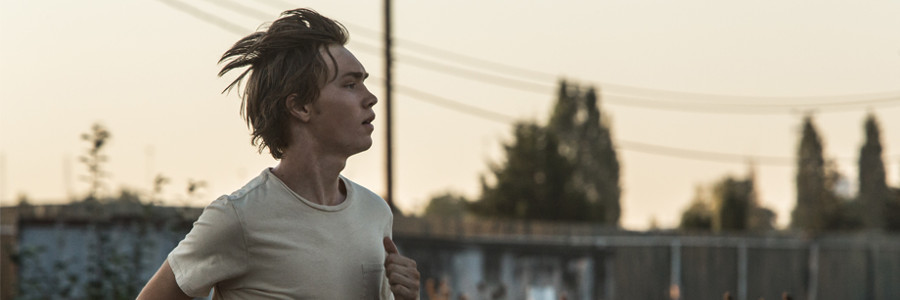If John Steinbeck were to script a modern equivalent to Anna Sewell’s eternal classic Black Beauty, it would more or less resemble Lean on Pete, the powerful new film from writer/director Andrew Haigh.
Adapted from Willy Vlautin’s book of the same name, Lean on Pete is the coming-of-age story of Charley Thompson (Charlie Plummer), a quiet and thoughtful 15 year-old who moves to Portland, Oregon with his father, Ray (Travis Fimmel). Charley’s not a stranger to taking responsibility for himself – his mother abandoned him as a child, and Ray spends most of his nights out with women – and so approaches racehorse trainer Del (Steve Buscemi) for a job.
At the stable, he develops a bond with aging quarter horse Lean on Pete. It’s not the traditional cinematic boy and beast relationship – ‘Pete’ never shows any particular intelligence or affection for his caretaker – but nevertheless, when Charley learns that the horse is to be sent to slaughter, he steals Pete and embarks on a journey to protect his friend and seek safety with his long lost aunt.
Haigh may be British, but that fact by no means dilutes the accuracy of his depiction of the struggles of the American underclass, particularly when it comes to the characters. Ray won’t be winning any father of the year awards, but he is kind and honest to Charley. Jockey Bonnie (Chloë Sevigny) is the first person Charley meets who he could consider a friend, yet when he ask her to help save Pete, she refuses. Being a female jockey is hard enough without getting into an argument with the one man who’ll hire you.
Nobody in Lean on Pete could be called definitively good or bad. Everybody has a bit of both in them. Everybody is desperate to survive.
That’s especially true in Charley’s case. The film takes its time stacking the world against both Charley and Pete, so when he makes the decision to steal the horse and flee interstate it’s a decision made not out of hope for a happy ending, but out of desperation.
As reality crashes down upon the pair, that desperation is transmitted to the audience. We are desperate to see them overcome their plight, no matter the dark turns their journey takes. That is in no small part due to the impact of Plummer’s brilliant performance. Sensitive and understated, it takes both a nuanced actor and director to ensure such a story doesn’t slip into melodrama. Remarkably, Lean on Pete never even gets close to doing so.
Danish cinematographer Magnus Joenck ensures the focus remains on the characters even when Charley and Pete wander through the desert. We may get a sense of the sprawling vista, but by always keeping the camera close to the oft-silent but expressive Charley, the audience sees all it needs to see to understand his plight.
James Edward Barker’s score must also be recognised. Even when it appears that life is going well for Charley, Barker warns the audience of what’s to come with a disconcerting, almost melancholic soundtrack.
Lean on Pete never shies away from the grim reality of Charley and children like him. For that reason, the film isn’t for everyone. Audience members that understand that, however, are bound to be left thinking about it long after the credits end.
—
Lean on Pete opens in Australian cinemas on November 29th.

